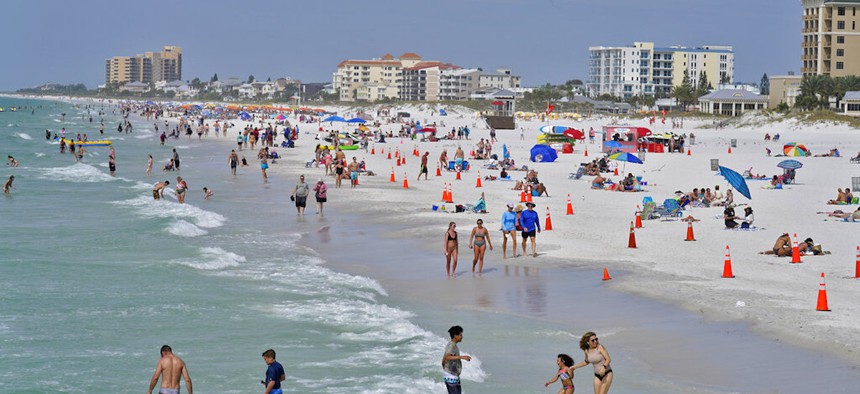Miami Beach Extends Curfew, State of Emergency as Visitors Swamp South Florida

Beachgoers take advantage of the sun, sand, and surf as they spend time on Clearwater Beach Tuesday, March 2, 2021, in Clearwater, Fla., a popular spring break destination, west of Tampa. Associated Press
City officials called an emergency meeting Sunday in Miami Beach to discuss mitigation measures for throngs of unruly gatherers after a week of arrests, fights and crowd-control headaches.
Officials in Miami Beach, Florida on Sunday extended a state of emergency through April 12 following days of fights, stampedes and arrests in crowds of increasingly raucous revelers.
The Miami Beach City Commission approved the measure unanimously at an emergency meeting Sunday. Commissioners also approved an extension of an 8 p.m. curfew in South Beach’s entertainment district, and 10 p.m. Thursday-to-Sunday road closures until April 12.
The measures were put in place Saturday by Raul Aguila, the interim city manager, who could not extend them for more than 72 hours without approval from the commission. The restrictions were necessary, he said, to “contain the overwhelming crowd of visitors and the potential for violence, disruption and damage to property.”
Sunday’s emergency meeting capped a chaotic weekend in south Florida, culminating in police from several jurisdictions joining together to enforce the 8 p.m. curfew on Saturday night. Officers eventually fired pepper balls to disperse a large, mostly maskless crowd gathered in the streets, sparking a stampede as people fled from the area.
From Friday to Sunday, the Miami Beach Police Department arrested more than 50 people and confiscated eight firearms. More than a thousand people have been arrested in the city since February, half of them from other states.
“We couldn’t go on any longer,” Police Chief Richard Clements told commissioners during Sunday’s meeting. “I think this was the right decision.”
The parties and crowd-control headaches have been largely attributed to students on spring break, but city officials said they believed the overwhelming numbers of visitors were driven mostly by pandemic fatigue.
“I don’t see this as sort of a spring break thing. I don’t think these are just college kids,” said Mayor Dan Gelber. “I think there are very few places that are as open as we have been open and our state has been open. We are attracting huge numbers of people. We are attracting all sorts of folks from all over the country.”
Florida has virtually no coronavirus restrictions in place. Gov. Ron DeSantis in September opened the state’s public beaches and lifted capacity limits on restaurants, bars, nightclubs and other venues. There is no statewide mask mandate, and while local leaders can “maintain or pass” their own ordinances, they’re prohibited from enforcing them via fines or other penalties.
“I believe it’s a lot of pent-up demand from the pandemic and people wanting to get out,” said Miami Beach City Commissioner David Richardson. “And our state has been publicly advertised as being open, so that’s contributing to the issue.”
Across the state, city and county leaders prepared for the influx of travelers as best they could, imposing crowd size restrictions on some beach events and launching educational campaigns encouraging tourists to wear masks.
The crowds come as Covid-19 case counts remain flat in Florida, though the state is a hotbed for several emerging, more-contagious variants of the virus. Miami Beach is still reporting roughly a thousand new cases per day, Gelber said, and hundreds of residents continue to check into hospitals each week.
“We’re in the middle of a pandemic. The virus is still very present in our community,” he said Sunday. “With that and the variant, we sort of have a triple threat right now.”
Kate Elizabeth Queram is a staff correspondent for Route Fifty and is based in Washington, D.C.
NEXT STORY: U.S. Covid-19 Testing Has Dropped Dramatically





